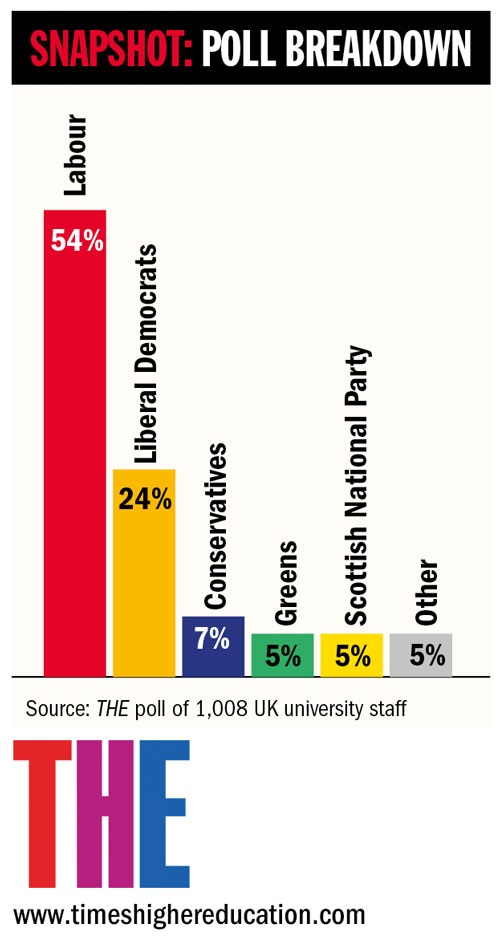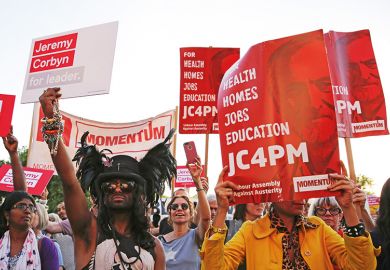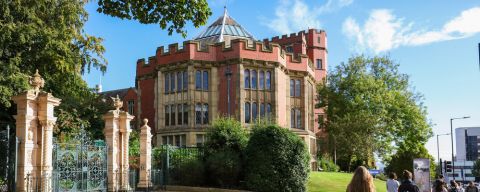More than half of UK university staff will vote Labour in the country’s general election next week, according to a Times Higher Education survey.
In an online survey of higher education employees that gained 1,008 responses, 54 per cent said that they intended to vote for Jeremy Corbyn’s party.
Labour were trailed by the Liberal Democrats (24 per cent), the Conservatives (7 per cent) and the Greens (5 per cent). Just one of the respondents said that they were planning to vote for the UK Independence Party.
The survey carries the caveat of being a self-selecting poll – it was not conducted to the standards of those carried out by professional polling companies.
Respondents were also asked how they voted in the 2015 general election. Support for Labour remained unchanged over the two years, but rose for the Liberal Democrats (up from 15 per cent in 2015), and fell for the Greens (12 per cent in 2015) and for the Tories (9 per cent in 2015).

Among the 100 respondents voting in Scotland in the coming election, 48 per cent said that they would vote for the Scottish National Party, with Labour the next most popular (19 per cent).
Asked whether Brexit was the main issue in the election, 55 per cent of respondents across the UK said no and 45 per cent said yes.
Interactive tool: find out where students could swing the election vote
A THE survey prior to the European Union referendum found that 89 per cent of respondents were planning to vote Remain.
The votes of higher education staff could be significant in some constituencies that host or neighbour large universities.
And the suggestions of a heavy slant towards Labour and the Liberal Democrats come at a time of increasing scrutiny of political balance in British universities.
Chris Hanretty, reader in politics at the University of East Anglia, conducted his own analysis of academics’ political views after a report by the Adam Smith Institute neoliberal thinktank earlier this year that used THE’s self-selecting survey from the 2015 election as its main evidence base in making a claim about “overrepresentation of left-liberal views” in UK academia.
Using 2014-16 data from the Understanding Society survey, run by the University of Essex, Dr Hanretty found that “academics support the Conservative Party and the UK Independence Party at lower rates than the general population. The reverse is true for Labour, the Liberal Democrats, and the Green Party,” he wrote.
Dr Hanretty told THE: “I think there is an argument that political diversity within academia is desirable, in so far as political diversity can help avoid groupthink. However, I think it’s probably far less important than other forms of diversity, such as diversity of gender and diversity of race.”
He added: “I am particularly concerned that the Right of British politics is forming a view of universities based on stories from particular university campuses in the United States, stories which in turn are aggressively promoted by different right-wing organisations.” But he said that such views of universities may also have been evident in the 1970s or 1980s.
Asked in the THE poll how higher education policy would affect their decision on which party to vote for, 8 per cent said “not at all”, 45 per cent said “to some extent” and 47 per cent said “significantly”.
Labour has pledged to abolish tuition fees, and to reintroduce public funding for universities and maintenance grants for students at a cost of £11.2 billion a year.
The survey asked respondents which system of higher education funding they thought best. Public funding without tuition fees was backed by 59 per cent, followed by a graduate tax (24 per cent), the English status quo of a £9,250 fee cap (11 per cent), fees not limited by a cap (4 per cent) and fees capped at a level above £9,250 (2 per cent).
Sixty per cent of respondents identified as academics, while 40 per cent identified as professional or support staff. Backing for Labour was marginally higher among professional and support staff (55 per cent) than among academics (53 per cent), but there were few appreciable differences between the two categories.
Respondents were also asked which university they worked at. Numbers by individual institution were small but, among institutions that produced more than 20 responses, support for Labour was highest at the universities of Sheffield (72 per cent of respondents) and Leeds (69 per cent). Support for the Lib Dems was highest at the University of Cambridge (50 per cent).
POSTSCRIPT:
Print headline: Majority backing for Labour in THE's pre-election poll
Register to continue
Why register?
- Registration is free and only takes a moment
- Once registered, you can read 3 articles a month
- Sign up for our newsletter
Subscribe
Or subscribe for unlimited access to:
- Unlimited access to news, views, insights & reviews
- Digital editions
- Digital access to THE’s university and college rankings analysis
Already registered or a current subscriber?






